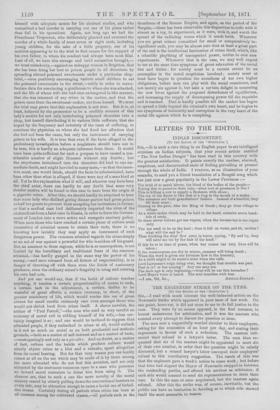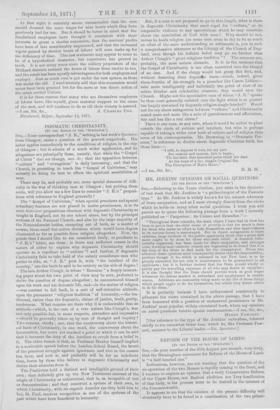THE ENGINEERS' STRIKE ON THE TYNE.
[To THE EDITOR OF TilmI " SPROTATOR.1 SIR,—I read with much interest the well-balanced article on the Newcastle Strike which appeared in your issue of last week. Om one point, howe ver, it did not seem to me to do full justice to the men. They were by no means opposed, in the first instance, to honest endeavours for arbitration, and it was the masters who. resisted every attempt to discuss the question at issue.
The men sent a respectfully-worded circular to their employers,. asking for the concession of an hour per day, and stating their argumeuts in favour of such a reduction. The masters inti- mated their refusal in a lawyer's letter. The men then re- quested that six of the masters might be appointed to meet six. of their own number, in order that the question might be calmly discussed, but a second lawyer's letter conveyed their employers' refusal to this conciliatory suggestion. The result of this was that the engineers gave a week's notice to cease work ; but before, that time had elapsed the Mayor of Newcastle stepped in between. the contending parties, and offered his services as arbitrator, if each side would consent to send six representatives to state their ease. In this the men at once acquiesced, but the masters again. refused. After this the strike was, of course, inevitable, but the public can have no hesitation in deciding as to which side showed itself the most amenable to reason. At first sight it certainly seems unreasonable that the men should demand the same wages for nine hours which they have previously had for ten. But it should be borne in mind that the Sunderlaud employers have thought it consistent with their interests to grant a similar concession, that the masters' profits have been of late considerably augmented, and that the increased vigour gained by shorter hours of labour will soon make up for the deficieucy of time. This last atateineat may appear to some to be of a hypothetical character, but experience has proved its truth. It is not many years since the colliery proprietors of the Midland districts reduced the hours of labour from twelve to ton, and the result has been equally advantageous for both employers and cmployjs. Just as much coal is got under the new system as there was under the old. I need scarcely add that this concession would never have been granted but for the more or less direct action of the much reviled Unions.
It is for these reasons that many who are themselves employers of labour have, like myself, given material support to the cause of the men, and will continue to do so till their victory is assured.































 Previous page
Previous page